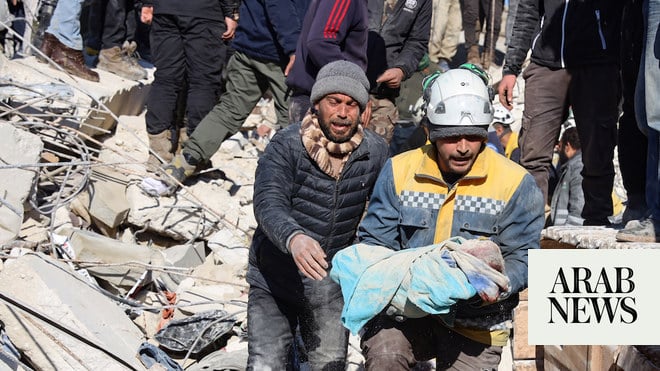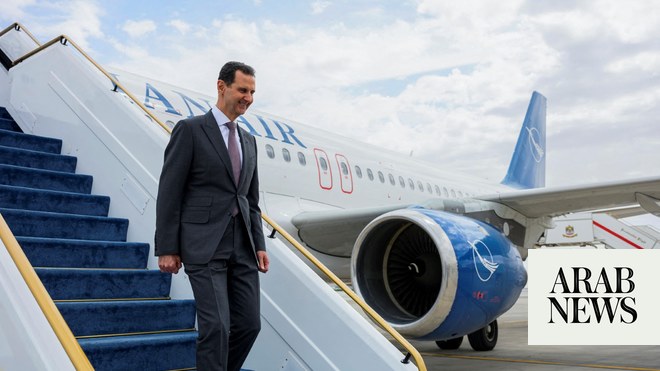
at present in need of humanitarian assistance
The way forward is littered with the same contradictions that bedeviled Syria during the war
MISSOURI, US: After more than 10 years of civil war, Syria remains a devastated country. An estimated 500,000 people have perished in the conflict, with the large majority victims of President Bashar Assad’s vicious operations to regain control of the country.
Some 12 million Syrians have become refugees or internally displaced persons after losing their homes.
At least 90 percent of the population now lives below the poverty line. Roughly one-third of Syria’s infrastructure lies in ruins. Aid organizations estimate that about 11 million Syrians are at present in need of humanitarian assistance, with famine looming as even bread and fuel supplies continue to dwindle.
Under such circumstances, the natural reflex might be to set aside objections regarding the Assad regime and move on to the difficult but very pressing work of helping people in Syria.
For all intents and purposes, Assad has won the war in any case, largely thanks to Russian and Iranian assistance. Keeping Syria isolated and sanctioned would only prolong the misery of a populace that has suffered enough already, so the theory goes.
Allowing the Assad regime back into the international fold, however, poses serious moral and practical problems. Does the international community really want to “let bygones be bygones” with a ruler who has massacred hundreds of thousands of his own civilians?
Some 12 million Syrians have become refugees or internally displaced persons after losing their homes. (AFP)
Many cannot accept the moral stain that would come with forgiving a regime that used chemical weapons against its own people, intentionally targeted hospitals in airstrikes, and committed mass executions of political prisoners — among other things.
If Assad sees his crimes forgiven, the message to other authoritarian leaders dealing with political protests would seem clear: They can do as they will, and the world will soon forget their transgressions. Thankfully, leaving the Syrian people to their misery and rehabilitating the Assad regime are not the only two options available.
There remain ways to help Syrians while simultaneously keeping the regime isolated and shunned.
First of all, Assad currently only controls two-thirds of Syrian territory. Rebel-held Idlib province in the north holds on with Turkish backing, while Turkey also occupies Afrin and another swathe of territory in the northeast.
The Syrian Kurds control a large tract of territory in the northeast as well, which includes 90 percent of Syria’s oil wells and a good chunk of its agricultural land.
Keeping 90 percent of Syria’s oil revenues out of Assad’s hands can go a long way toward punishing his regime and empowering other Syrian actors, particularly given that oil revenues normally flow directly into government coffers (the rentier state model).
The people in these patches of territory should benefit from cross-border international assistance that does not have to pass through the Syrian capital Damascus. This requires continually renewing UN resolutions allowing for such aid, and Russia needs to be convinced not to veto such moves.
More than a million people in the rebel-controlled northwest risk being cut off if the UN Security Council does not renew authorization for cross-border aid delivery through the Bab Al-Hawa crossing at the Turkish border — the last remaining crossing for UN aid. A decision is expected in the next two weeks.
“Reaching all Syrians in need via the most direct routes is not a political choice; it is a humanitarian imperative,” David Miliband, chief executive of the International Rescue Committee, said recently. But if the past is any guide, Security Council action on Syria is not driven by what Miliband called the “stark humanitarian realities.”
In 2020, China and Assad regime-backer Russia vetoed resolutions that would have allowed two other crossing points — Bab Al-Salam and Al-Yaroubiya — to remain open. Now Russia has hinted it will block the renewal of the resolution on Bab Al-Hawa, insisting other aid routes via Damascus are available.
“It is shameful that political posturing at the Security Council is still impeding the international response to one of the worst humanitarian crises of our time,” Diana Semaan, Syria researcher at Amnesty International, said in a June 25 statement.
She added: “Years of hostilities and mass displacement have led to a humanitarian disaster in northwest Syria.”
At least 90 percent of the population now lives below the poverty line. (AFP)
Aid agencies are skeptical about the Syrian government’s ability to replace the Bab Al-Hawa aid corridor in view of its hand in last year’s fiasco in the Kurdish-controlled northeast.
In Jan. 2020, the Al-Yaroubiya crossing closed, ending UN delivery of aid across the border from Iraq. UN operations through the crossing were supposed to be replaced by deliveries from Damascus. However, the volume of aid reaching the area declined sharply due to the regime’s bureaucratic impediments and restrictions on access.
“The notion that the Syrian government can replace UN aid is absurd. Not only would it be impossible for the government to match the scale of support provided cross-border, the authorities are notorious for systematically blocking humanitarian access,” Semaan added.
Clearly, until the Assad regime changes or adopts the kind of reforms necessary to safeguard people under its rule, no one should rush to encourage a return of Syrian central government control over these areas.
The Kurdish-led enclaves in particular should be recognized as a more legitimate and authentic local political authority than the Assad regime. This can occur without calling into question the territorial integrity of the Syrian state.
There exists a myriad of historical and contemporary examples of such recognition, whether in the form of governments in exile or governments in control of only a portion of a state’s territory.
The Kurdish-led cantons have in fact proved much more liberal toward various religious and ethnic groups in their territory than the Assad regime, and more democratic as well. In the case of Turkish-backed Idlib province, a return to central government control would also precipitate yet another refugee crisis, with people fleeing the Assad regime’s vengeance.
Roughly one-third of Syria’s infrastructure lies in ruins. (AFP)
For the Syrian population that remains under the writ of Assad, the international community needs to find ways to support their economic recovery without empowering or recognizing Assad’s regime.
This means avoiding broad and wide-ranging sanctions on Syria. While more narrow, targeted sanctions against the Assad regime and its officials can and should continue, the Syrian people as a whole need not fall within this sanction net.
A lot of basic infrastructure in Syria also needs rebuilding, of course, but such projects seem difficult to contemplate for an international community that does not wish to recognize or rehabilitate the Assad regime.
This task might therefore best be left to Assad’s Russia patrons, according to one school of opinion. Its logic goes something like this: It was Russian air power and Russian-supplied armaments that destroyed much of the infrastructure in any case, so let them be the ones to rebuild it.
On the diplomatic front, state-controlled media in Damascus recently hailed the resumption of Syrian relations with a number of Arab states and even a few Western ones — claiming that the thaw in relations came “after Syrian President Bashar Assad won a landslide re-election victory” in May.
Allowing the Assad regime back into the international fold poses serious moral and practical problems. (AFP)
Leaving aside the dubious nature of Assad’s elections, the fact remains that channels of communication with Syria need to be reopened at some point.
A majority of Arab League states seem to now support some level of reconciliation with Assad’s Syria and Syria’s readmission to the organization. This seems necessary if only to coordinate humanitarian aid for the Syrian people.
Without some form of Arab constructive engagement in Syria, the future of the country could well be decided by the Middle East’s new powers: Iran, Russia, Turkey and Israel.
The way forward thus appears littered with the same kind of contradictions that bedeviled Syria throughout its civil war: A series of bad and worse options, none of which offer a very satisfactory resolution.
• David Romano is Thomas G. Strong Professor of Middle East Politics at Missouri State University












